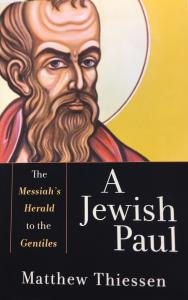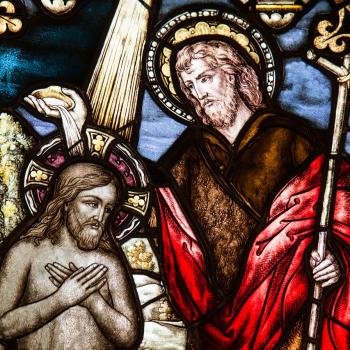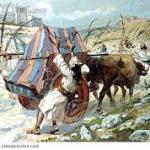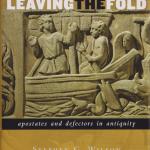One book that recently caught my eye has the striking title, A Jewish Paul: The Messiah’s Herald to the Gentiles (Baker Academic, 2023). When I picked it up and starting browsing through it, I knew that I needed try to conduct an interview with its author, Matthew Thiessen. I now have the privilege of presenting that interview.
Dr. Matthew Thiessen earned his Ph.D. at Duke University and is currently associate professor of religious studies at McMaster University. He has authored publications such as Jesus and the Forces of Death (Baker Academic, 2020), Paul and the Gentile Problem (Oxford University Press, 2016), and co-edited with Rafael Rodriguez, The So-Called Jew in Paul’s Letter to the Romans (Fortress Press, 2016).
A Jewish Apostle Paul: The Interview
Oropeza

How does A Jewish Paul differ from your larger work, Paul and the Gentile Problem?
Thiessen
Paul and the Gentile Problem is a book based on original research that I conducted on the Apostle Paul’s thinking especially around the question of how gentiles were to join the Jesus movement.
In that book, I focused predominantly on the hot-potato question of the first-century Jesus movement—should gentile men undergo circumcision and take on all aspects of the Jewish law as part of their fidelity to the Jewish Messiah? And I tried to give a fresh account as to why Paul answers this question with a “No!” He does this without falling into traditional denigrations of circumcision or the Jewish law or Judaism.
I wrote A Jewish Paul, in part, because a number of people had asked me to write a popular-level book about Paul’s thinking as it relates to Judaism more broadly. This way professors could assign it in undergraduate classes, or laypeople and non-scholars could pick up and enjoy reading it.
So, it is deeply dependent on the original research of Paul and the Gentile Problem, but it tries to be as accessible as possible. At the same time it broadens the arguments there to give a slightly fuller account of Paul’s thinking as it fits within the Judaism of his day.
Oropeza
In your book, you claim that Paul is “weird.” I agree with you; in fact, in one of my interviews with Matthew Novenson, I ended up giving it the title, “Paul is weird” since this was his claim, too. What makes Paul weird in your opinion?
Thiessen
When I was an undergrad and I wanted to find a book on a topic in the library, I had to use a library card catalogue to find books on circumcision or Paul or Romans. I like to think I’m not all that old, but when I show my current students a picture of a library card cabinet, none of them know what it is.
Oropeza
I remember those catalogues! The books and authors were typed on thick, little manila-like cards. My, my, how things have changed.
Thiessen
My students all get to look things up on library websites, often able to read articles and books online from the comfort of their dorm rooms. So, if they were to try to picture me doing research as an undergrad, they would construct a picture that is more like their own experience than it is like mine.
There is only a 25-year gap between my undergrad experience and theirs, and yet they almost automatically misrepresent it. How much more so is this the case for all of us when we think about people 100 years ago or 500 years ago, or in the case of Paul almost 2000 years ago? We make Paul more familiar and more like us as we read him without even realizing it. So, our task is to let Paul be weird again to us, to defamiliarize him so we can actually come to understand him better.
Oropeza
Good point.
Thiessen
Think about the shared knowledge of our modern world—the earth is a sphere, the universe is massive and expanding, the stars consist of plasma, gravity tethers us to earth, we need oxygen to breath, our bodies consist of trillions of cells, etc. Ancient people held to almost none of these things. Of course, Paul doesn’t write scientific treatises and so many of his beliefs don’t surface in his letters.
But I am convinced that some ancient science does affect Paul’s thinking—things like the common ancient belief that stars were living and divine beings or that pneuma (often translated as “spirit”) might well have been material. We often miss these things because we just unthinkingly import our modern understandings as we read ancient texts. Making Paul weird means trying to unearth some of those old assumptions that are so foreign to us but so familiar to Paul.
And when we naturally ask our own questions in Paul’s letters, we may very well miss the sorts of questions that animated him. We don’t wonder whether gentiles can be part of this Jewish sect that follows Jesus, precisely because some of Paul’s arguments were so successful and Christianity became a predominantly gentile movement in relatively short order. We don’t wonder whether gentile men need to undergo circumcision. But these are very real and heated debates in Paul’s day.
Repeatedly, I think, we forget that Paul was an ancient Jew, with Jewish sensibilities and theology. And we need to let Paul be Paul even if it means we have more uncertainty about what to do with him and his writings!
Oropeza
Paul contrasts the “works of the law” with righteousness by faith (Galatians 2:16; 3:2, 5, 10; Rom 3:20, 28). The interpretation of the “works of the law” often distinguish traditional Protestant from new perspective scholars. The former normally understand the phrase as observance of the law of Moses in terms of human effort/works righteousness. The latter often see it as Jewish identity markers such as circumcision, sabbath keeping, and dietary rules. I suspect you do not agree with either. If so, what do you interpret the phrase to mean?
Thiessen
Perhaps surprisingly, I find myself both agreeing and disagreeing with both traditional and new perspective scholars of Paul on the meaning of “works of the law.” I think new perspective writers were and are right to stress the ethnic component of works of the law. These aren’t, in the first instance, meant to signify human effort or good works in the way that Luther understood them. These are specifically works of the Jewish law like circumcision, sabbath, and dietary laws. But I disagree with new perspective scholars who understand Paul’s criticism of works of the law to be that they are identity markers that lead Jews into ethnocentrism and thus that they need to be abandoned.
Rather, I think Paul affirms their identity-marking function. These (and other) works of the law are specifically and only for Jews. Gentiles should not try to do them precisely because God did not intend for gentiles to do them. So, when gentiles try to do them, they are in fact not doing them because they aren’t supposed to do them. Jews, on the other hand, in doing “works of the law” are observing precisely what God has given them.
And this is where I think the traditional reading of Paul points to an important aspect of Paul’s thinking. When gentiles who already believe in Jesus try to do the works of the law—deeds that God did not require of them—they are behaving in such a way that implicitly suggests that they need to do certain deeds to curry favor with God. I think this is, to Paul’s mind, a very different situation than that of Jewish believers in Jesus. They, after all, have been doing the works of the law and to these works of the law they have now “added” faith in Jesus.

















